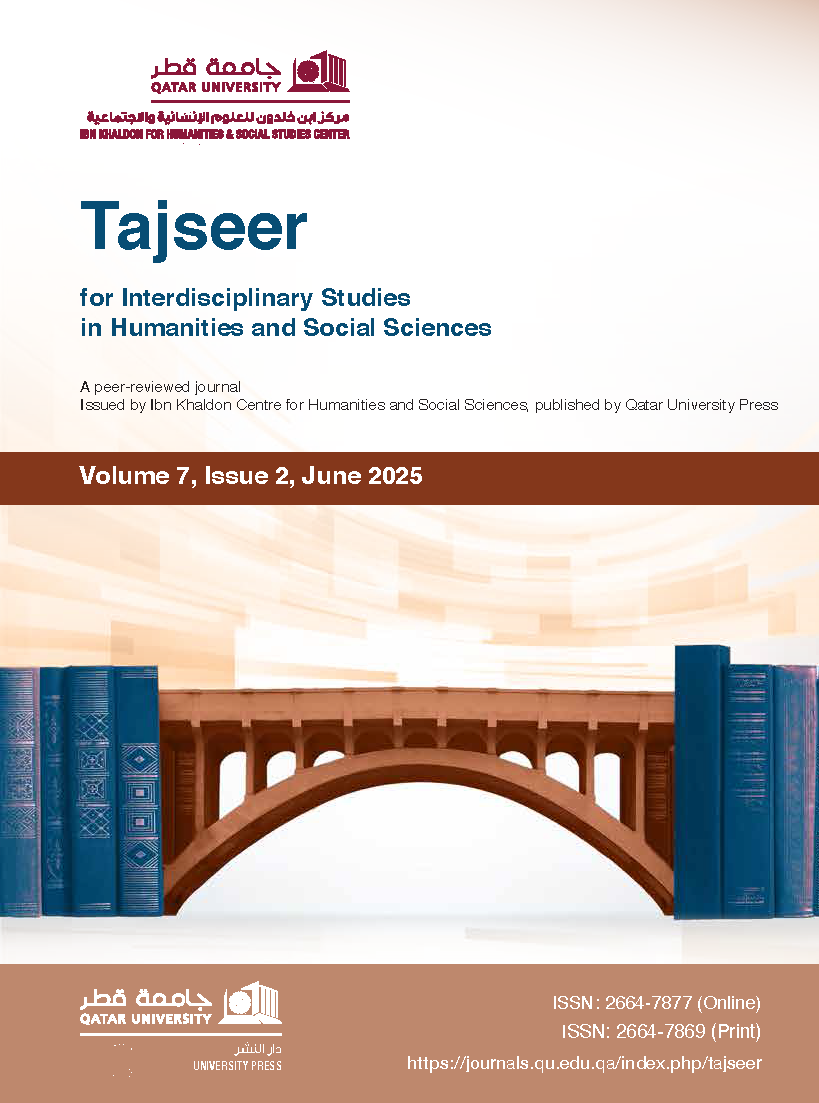The Impact of Primary Affiliations on Organized Violence: Interdisciplinary Approaches
Abstract
Regional affiliations can be viewed as the black market or shadow realm of politics, surfacing and flourishing whenever the natural political order is disrupted or political systems face crises. These affiliations represent a manifestation of illegitimate practices within the broader power struggles. Their roots stem from the ethnic, tribal, and sectarian diversity that defines pluralistic societies. Although this cultural and social diversity is rich, it inherently generates tensions among different social groups, often culminating in collective violence, where each tribe fosters its own solidarity and deploys it against others. From this fixed perspective, tribalism appears as a structural issue within societies with pluralistic frameworks, making its elimination difficult as long as these structures persist. Despite this, no definitive solution or comprehensive approach has yet been found to address civil wars and collective violence in countries like Sudan and Ethiopia, highlighting the urgent need to explore mechanisms to mitigate these phenomena or to promote peaceful and sustainable coexistence. In addressing the research question on the relationship between regional affiliations and collective violence, an interdisciplinary approach has been adopted, incorporating sociology, political science, and intersecting fields within the social sciences. With recent developments, tribes have assumed an increasingly prominent role in the political landscape, often participating in the political process to serve the interests of regimes or the state. However, this shift presents a significant threat to national identity, as it reproduces tribal affiliations as parallel centers of power, undermining the concept of citizenship and an inclusive sense of national belonging.
Metrics
##plugins.themes.bootstrap3.article.details##
TribalismSectarianismCollective ViolenceInterdisciplinary Approach
Anderson, Bendict. Imagined Communities: Reflections on the Origin and Spread of Nationalism, London, Verso, 1983.
Barnard, Alan & Spencer, Jonathan (ed.). Encyclopedia of Social and Cultural Anthropology, London: Routledge 11 New Fetter Lane, 1998.
Bauman, Zygmunt. Modernity and the Holocaust, Ithaca: Cornell University Press, 2000.
Bishara, Azmi. Sect, Sectarianism and Imagined Sects (in Arabic), Beirut: Arab Center for Research and Policy Studies, 2018.
Bonnewitz, Patrice. Premières leçons sur la sociologie de Pierre Bourdieu, Paris : Presses Universitaires de France, 2e éd., 2002.
Bradley, Harriet. Fractured Identities: Changing Patterns of Inequality, Cambridge: Polity Press,1996.
Bū Ṭālib, Muḥammad Najīb. Sūsiyūlūjiyā al-Qabīlah fī al-Maghrib al-‘Arabī (in Arabic), Beirut: Markaz Dirāsāt al-Waḥdah al-‘Arabīyah, 2008.
Clifford Geertz, “The integrate revolution: Primordial Sentiments and Civil Politics in the New State,” In: Clifford Geertz (ed.), Old societies and new states: The quest for modernity in Asia and Africa, London: Collier-Macmillan, 1963.
Conner, Walker. “A Nation is a nation, is a State, is an Ethnic Group, is a...,” Ethnic and Racial studies, Vol. 1, No. 4 (1978), pp. 377-400. https://doi.org/10.1080/01419870.1978.9993240
Durkheim, Émile. Les formes élémentaires de la vie religieuse Le systéme totémique en Australie Sects (in Arabic), tradu. Randah Baʿth. Beirut: Arab Center for Research and Policy Studies, 2019.
Ghalyūn, Burhān. Niẓām al-Ṭāʾifiyyah: Min al-Dawlah ilá al-Qabīlah (in Arabic), Casablanca: Al-Markaz al-Thaqāfī al-ʿArabī, 1990.
Giddens, Anthony. Sociology (in Arabic), trans. Fāyiz al-Ṣuyāgh, Beirut: Arab Organization for Translation, 2005.
Godelier, Maurice. Les Tribus dans l'Histoire et face aux Etats (in Arabic), tradu. Khalil Aḥmed Khalil et Ghazi Berro, Beirut: Dar alfarabi, 2015.
Hills, Edward. “Primordial, personal, sacred, and civic ties,” British Journal of Sociology, No. 8 (1957).
Horowitz, Donald L. The Deadly Ethnic Riot, Berkeley: University of California Press, 2001.
Ibn Khaldūn, ʿAbd al-Raḥmān. Muqaddimat Ibn Khaldūn (in Arabic), ʿAlī ʿAbd al-Wāḥid Wāfī (ed.), Vol. 4, part 1, Cairo: Lajnat al-Bayān al-ʿArabī, 2nd ed, 1965.
Ibrāhīm, Saʿd al-Dīn. Al-Milal wa’l-Niḥal wa’l-Aʿrāq fī al-Waṭan al-ʿArabī (in Arabic), Cairo: Ibn Khaldun Center for Development Studies, 1993.
Levene, Mark. Genocide in the Age of the Nation State, Vol. 2, New York: I. B. Tauris, 2005.
Lombard, Jacques. Introduction A L’Ethnologies (in Arabic), tradu. Ḥasan Qubaysī, Casablanca: Al-Markaz al-Thaqāfī al-ʿArabī, 1997.
Macek, Ivana. Sarajevo under Siege: Anthropology in Wartime, Philadelphia: University of Pennsylvania Press, 2009.
Mann, Michael. The Dark Side of Democracy: Explaining Ethnic Cleansing, New York: Cambridge University Press, 2005.
Morgan. Lewis, Ancient Society, New York: Henry Holp, 1877.
Özkirimli, Umut. Theories of Nationalism: A Critical Introduction (in Arabic), trans. Muʿīn al-Imām. Beirut: Arab Center for Research and Policy Studies, 2013.
Polletta, Francesca and Jasper, James M. “Collective Identity and Social Movements,” Annual Review of Sociology, Vol. 27 (2001), pp. 283-305. https://doi.org/10.1146/annurev.soc.27.1.283
Smith, Anthony D. Ethno-Symbolism and Nationalism: A Cultural Approach (in Arabic), trans. Aḥmad al-Shīmī, Cairo: National Center for Translation, 2014.
Taylor, Christopher. Sacrifice as Terror: The Rwandan Genocide of 1994, London: Berg, 1999.
Van Den Berghe, Pierre L. “The present state of comparative Race and Ethnic Studies,” In: Jan Berting (ed), Problems in International Comparative Research in the Social Sciences, Oxford: Pergamon Press, 1979.
Weber, Max. Economy and Society: An Outline of Interpretive Sociology, Guenter Roth and Claus Wittich (eds.), trans. Ephraim Fischoff et al., Berkeley: University of California Press, 1978.
****************************************************************************************
العربية
إبراهيم، سعد الدين. الملل والمنحل والأعراق في الوطن العربي. القاهرة: مركز ابن خلدون للدراسات الإنمائية، 1993.
أوزكيريملي، أوموت. نظريات القومية: مقدمة نقدية، ترجمة معين الإمام. بيروت: المركز العربي للأبحاث ودراسة السياسات، 2013.
بشارة، عزمي. الطائفة، الطائفية، الطوائف المتخيلة. بيروت: المركز العربي للأبحاث ودراسة السياسات، 2018.
ابن خلدون، عبد الرحمن. مقدمة ابن خلدون، تحقيق علي عبد الواحد وافي. القاهرة: لجنة البيان العربي، ط2، 1965، مج 4، ج1.
بو طالب، محمد نجيب. سوسيولوجيا القبيلة في المغرب العربي. بيروت: مركز دراسات الوحدة العربية، 2008.
دوركهايم، إميل. الأشكال الأولية للحياة الدينية: المنظومة الطوطمية في أستراليا، ترجمة رندة بعث. بيروت: المركز العربي للأبحاث ودراسة السياسات، 2019.
سميث، أنتوني. الرمزية العرقية والقومية: مقاربة ثقافية، ترجمة أحمد الشيمي. القاهرة: المركز القومي للترجمة، 2014.
علي، جواد. المفصل في تاريخ العرب قبل الإسلام. بيروت: دار العلم للملايين، 1970، مج 4.
غدنز، أنتوني. علم الاجتماع، ترجمة فايز الصُياغ. بيروت: المنظمة العربية للترجمة، 2005.
غليون، برهان. نظام الطائفية: من الدولة إلى القبيلة. المركز الثقافي العربي، الدار البيضاء، 1990.
لومبار، جاك. مدخل إلى الإثنولوجيا، ترجمة حسن قبيسي. الدار البيضاء: المركز الثقافي العربي، 1997.
موريس، غودلييه. القبائل في التاريخ في مواجهة الدول، ترجمة خليل أحمد خليل وغازي برو. بيروت: دار الفارابي، 2015.



 https://orcid.org/0009-0003-4519-7556
https://orcid.org/0009-0003-4519-7556